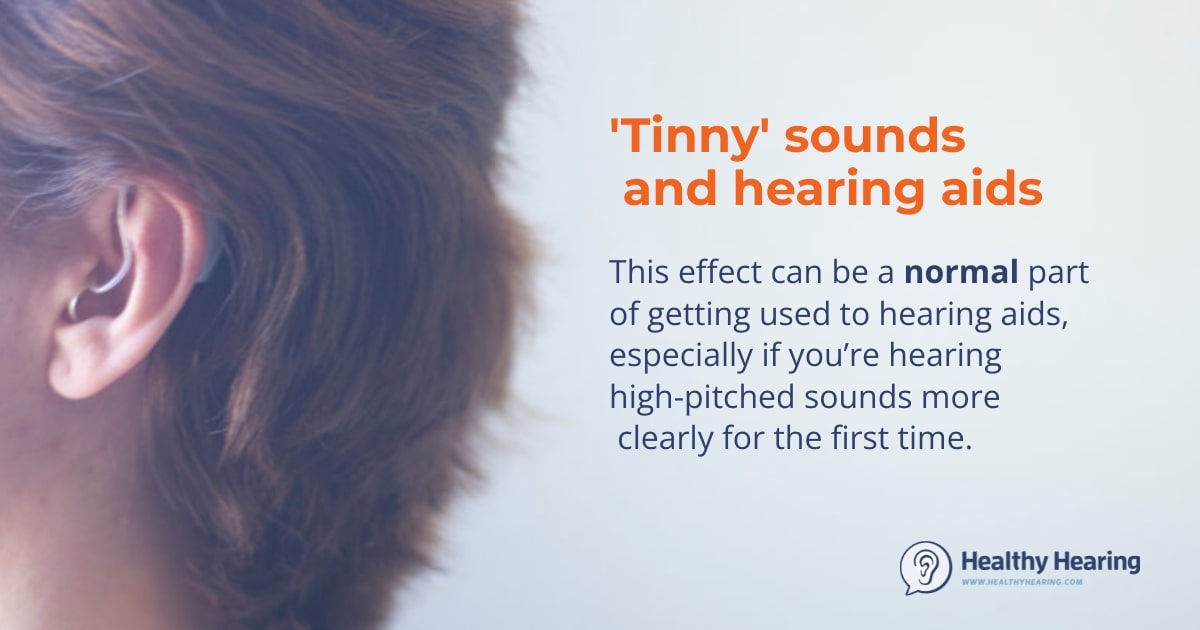|
www.HealthyHearing.com |
Why do my hearing aids sound tinny?Causes, solutions, and tips for new users struggling with tinny sound
Contributed by Emily Ostrowski, content manager, Healthy Hearing Key points:
If you have new hearing aids, and notice that noises can sound sharp, metallic, or “tinny,” you’re not alone. "It is very common for patients to note a tinny or sharp sound when they are getting used to new hearing aids," said Dr Gary Fike, AuD, audiologist and owner of Palmetto Family Hearing Center in Tega Cay, SC. This effect can be a normal part of getting used to amplification, especially if you’re hearing high-pitched sounds more clearly for the first time. Occasionally, a tinny sound may point to issues with fit, settings, or device issue that needs attention. Understanding what’s normal, what’s not, and when to seek help from a hearing specialist can ensure you get the best possible benefit from your hearing aids. Why do noises sound sharp using hearing aids?Hearing aids amplify sounds at the frequencies you struggle to hear. The most common type of hearing loss is sensorineural hearing loss, which usually makes higher-pitched sounds harder to notice. That’s why things like a microwave beeping, birds chirping, or children’s voices can be more difficult to hear. 
When you start wearing hearing aids your ears (and your brain) are suddenly picking up and processing these higher-pitched sounds again. Many people with hearing loss wait years or even decades before treatment. So, if you haven't heard these sounds clearly in awhile, they may sound sharp, tinny, or unnatural at first. This is quite normal. Learn more: Understanding high-frequency hearing loss When will tinny sounds in hearing aids go away?As you wear your hearing aids regularly and consistently, your brain adjusts to the new input. Over time, those tinny sounds usually fade away, and everyday noises start to sound more natural again.
Though it varies a bit with every patient, Dr. Fike noted that on average it takes a few days to a few weeks for the high frequency sounds to no longer be perceived as tinny. During the hearing aid fitting, he tells his patients not to be surprised if sounds like running water, footsteps, or a rustling newspaper all sound sharp at first. He makes sure to point out that this is actually a good thing. "I tell all of my new patients that they will hear sounds that feel sharper than they remember," he said. "This is normal and a positive thing, as it will bring more clarity of sound and speech once they are used to it." Consistent use shortens adjustment timeWhen it comes to the adjustment phase, it's important to be both patient and consistent. The more you wear your hearing aids, the quicker your brain will adjust. "Wearing the hearing aids every day—and for over 12 hours a day—will help you get used to the sound much quicker," said Dr. Fike. "Intermittent wearing of the hearing aids will prolong the adjustment time." More: Should you wear hearing aids all the time? Do sharp sounds mean something is wrong?While often a normal part of adjusting to hearing aids, there are cases where tinny or sharp sounds can mean that there is an issue with your device. Specifically, Dr. Fike noted that a tinny sound can mean that the hearing aid's receiver or speaker may be having an issue. "I compare this to when a car has a blown speaker and you get the distorted sound," he said. When the issue is mechanical, it's more likely to appear suddenly after your hearing aids have been working fine for some time. In that case, contact your hearing specialist to see if repairs or replacements are required. Also, sometimes these sounds can mean that your device’s high-frequency settings may need further adjustment. Keep your audiologist or hearing care provider informed of any prolonged issues that you are having and they will work with you to adjust your settings as needed. Be proactive about your hearing healthHearing aids are an essential tool for staying connected to the sounds around you, and it’s normal to notice occasional odd or annoying noises as your ears adjust. Wearing your devices consistently and communicating any issues with your hearing specialist ensures a quicker adjustment period and a better user experience. If you are considering hearing aids or looking for a provider for a loved one, visit our directory of local hearing aid clinics near you. You can read verified customer reviews and book an appointment today. Emily Ostrowski, content manager, Healthy Hearing
Related Help Pages:
Hearing aids Fitting
|
Featured clinics near me
Earzlink Hearing Care - Reynoldsburg
7668 Slate Ridge Blvd
Reynoldsburg, OH 43068

Find a clinic
We have more hearing clinic reviews than any other site!


 Emily is an experienced journalist and medical content writer based in Maine. Passionate about delivering enlightening and accurate content, she is committed to empowering people to make informed choices regarding their hearing health.
Emily is an experienced journalist and medical content writer based in Maine. Passionate about delivering enlightening and accurate content, she is committed to empowering people to make informed choices regarding their hearing health.